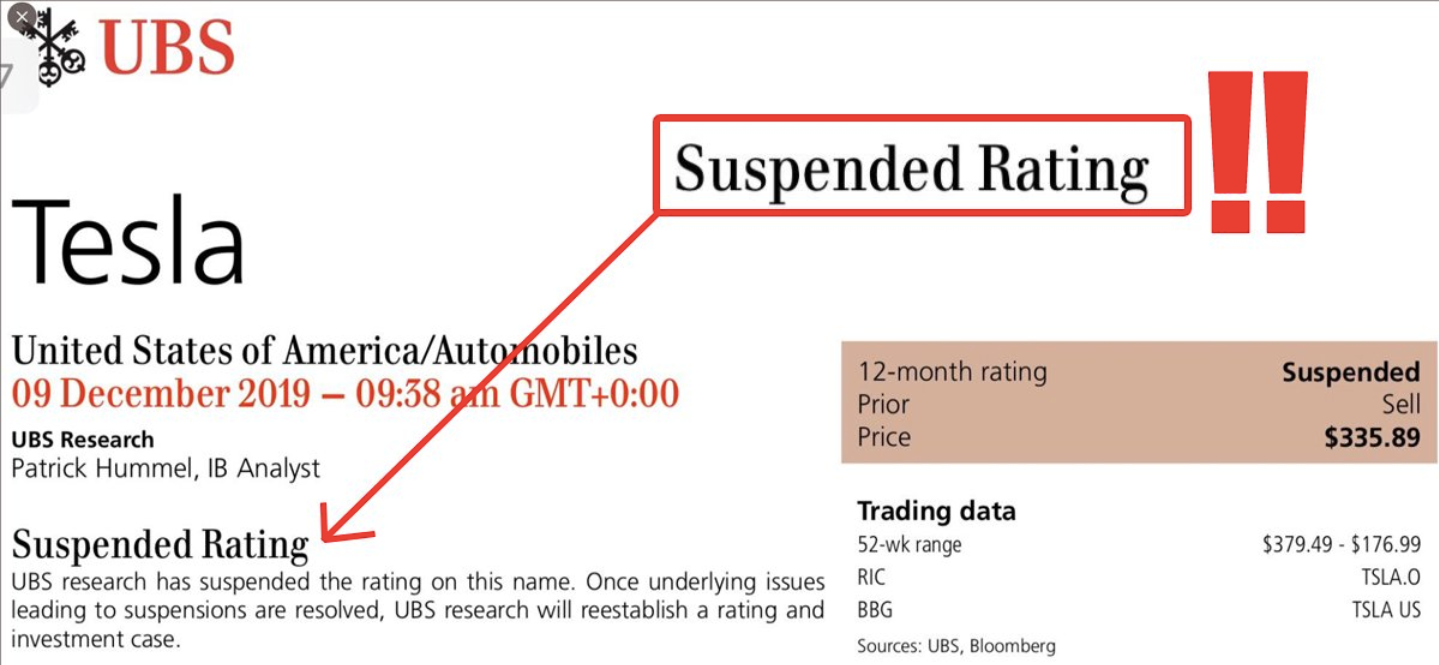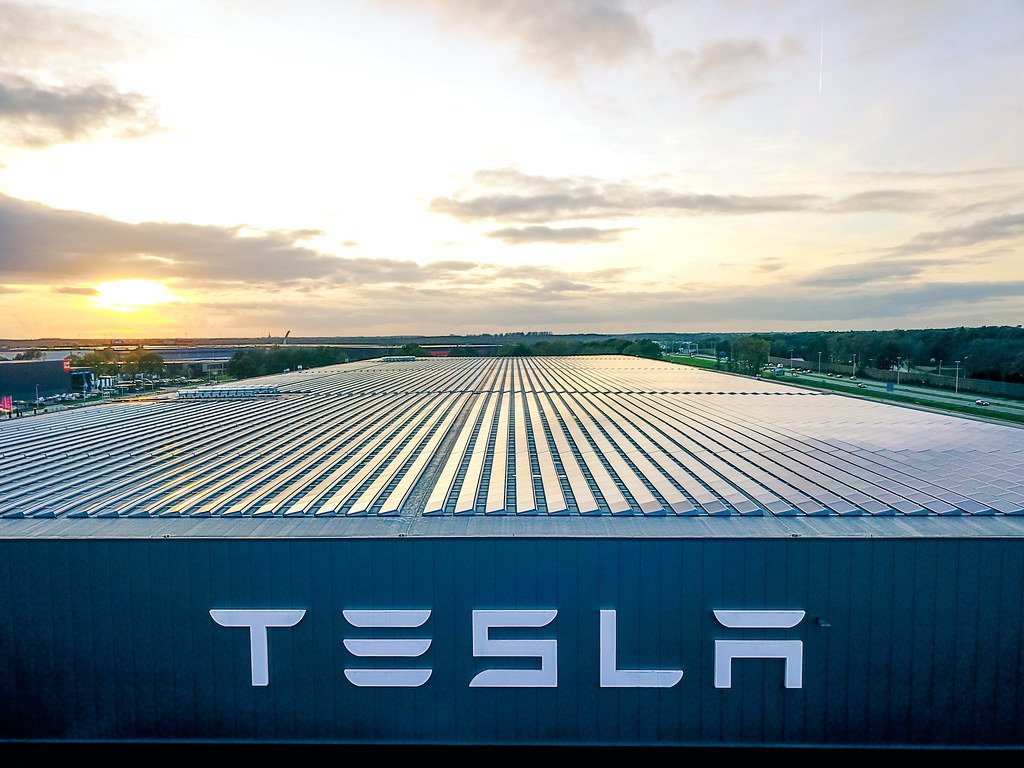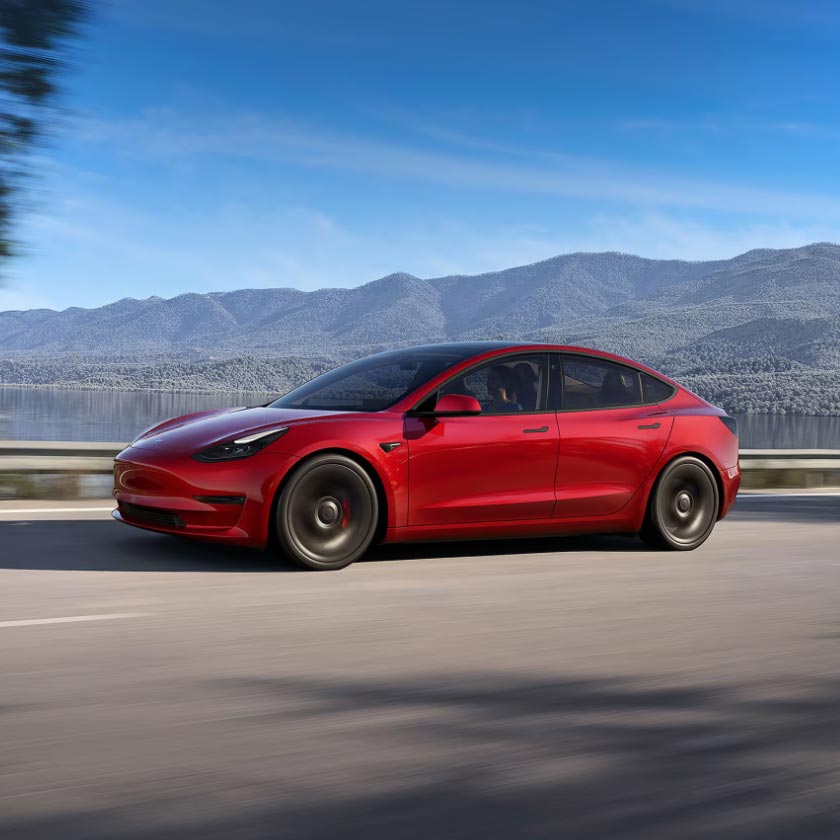UBS has suspended its bearish rating on Tesla (NASDAQ: TSLA) shares as rumors of an SEC investigation into the firm continue to spread. A deep dive into the investment bank and financial services company’s TSLA ratings don’t show it in the best of light. If there is an investigation, the SEC might be looking into several scenarios relating to UBS and TSLA shares.
Reports from the TSLA investment community have indicated that UBS has suspended its coverage of the electric car maker. The suspension of UBS' TSLA coverage might have something to do with a rumored SEC investigation into the firm. However, nothing has been confirmed as of this writing.
UBS' last TSLA recommendation was similar to its stance over the years. Despite the electric car maker's changing landscape and its Q3 profits, UBS maintained its SELL rating.
UBS Research has suspended rating on $TSLA
— 👻Loky👻 (@loky080659) December 9, 2019
Rumors there is ongoing screening of $TSLA shorts by SEC...$TSLA$TSLAQ pic.twitter.com/NHqnlir8zC
UBS’ SELL Rating on TSLA
According to Clean Technica’s Zachary Shahan, UBS Group AG gave TSLA shares a SELL rating 18 times in two years. In contrast, the same company gave GM a BUY rating 35 times in the last 7 years. Shahan notes that UBS has only ever recommended selling TSLA stocks and has not fluctuated in its stance ever since, despite any breakthroughs or milestones that were achieved by the electric car maker.
To an experienced investor, UBS’s firm SELL rating on TSLA could ring alarm bells because stocks fluctuate and conditions change in a company, thereby affecting analysts’ ratings. For some, the investment bank’s constant SELL rating is a sign that UBS is not entirely neutral or unbiased when it analyzes TSLA stock.
UBS / #Tesla Smoking Gun
— Groggy T. Bear (@GroggyTBear) August 24, 2018
1. Paid Munro & Assoc. for #Model3 study
2. Munro recants and says Model 3 is profitable
3. UBS short ~$300M on $TSLA
4. UBS is publicly denying (with information campaign) results of Munro study
5. Munro is sued and gagged (by unknown party) pic.twitter.com/cr1a5pTx4V
UBS’ Apparent Entanglement with Munro’s Tesla Model 3 Silence
Besides its firm SELL rating on TSLA, UBS was rumored to have also been somewhat involved in auto expert Sandy Munro’s gag order concerning his teardown of Tesla’s Model 3. It has been speculated that UBS paid Mr. Munro’s company Munro & Associates to study the Model 3 and its components, presumably to get an accurate price check on all-electric sedan’s parts. UBS previously contracted Munro's company to tear down and study the Chevy Bolt, GM's all-electric hatchback.
When Munro reviewed the Model 3’s exterior, he found Tesla’s sedan disappointing because of its inconsistent panel gaps. When he dived deeper into the Model 3, however, his judgment of the all-electric vehicle flipped.
Munro was particularly impressed by the Model 3's tech. He said the electric vehicle’s Automatic Drive Modules were similar to that found in F-35 fighter jets in the US Military. In an Autoline interview, Munro explained why Tesla’s tech was leagues above others in the auto industry.
“If you look at this thing, this is cellphone technology. This is the technology we would see in really high-end computers, normally for the government. When you look at this, you’re looking at the same kind of technology you’d see on a flight controller for an F-35, and we kind of know a little bit about that too. We do work for the military. Everything here smacks of cellphone technology and defense technology,” said Munro.
Following a positive update on the sedan where he estimated a 30% profit for the Long Range RWD Model 3, Munro was slapped by a gag order from an unnamed person or company related to the teardown of the electric car. However, some sleuths in the Tesla community have gathered some connections that floats the idea that UBS may have silenced Munro following his Model 3 teardown.
UBS and the Chinese Wall
Following Goldman Sachs' persistent Sell rating on TSLA despite the firm's growing holdings in the electric car maker, Hyperchange host Galileo Russell talked about an investment practice called the Chinese wall. It’s when two facets of a company, like the investment bank division and the financial services sector of UBS, are prohibited from communicating with each other. Exchange of information between two divisions of a company that deals with investment could cross some ethical boundaries, which is why a metaphorical Chinese wall is built.
For more clarification on the subject, here is an explanation from Investopedia:
“For example, a financial services firm might have a corporate investment arm that is acting on behalf of a public company planning a takeover of a rival company. The talks are highly confidential, not least because of the potential for illegal insider trading on the information. Yet the same firm has investment advisers in another division who may be actively advising clients to buy or sell stock in the companies involved. The Chinese wall is supposed to prevent any knowledge of the takeover talks from reaching the investment advisers.”
As an investment firm and financial services company, UBS would be a good candidate for the Chinese wall practice. The company’s suggested SELL rating on TSLA comes from its financial services sector. But on its investment firm side, UBS may have held a short position in TSLA in 2018.

Credit: Tesla
The Truth about UBS
So far, everything mentioned in this article has not been confirmed by UBS or any authorities on the matter. However, one granite of truth does exist in UBS’ stance against TSLA.
Despite its airs of knowledge about TSLA shares and the company's future, UBS simply doesn’t really know enough about Tesla’s fleet to make a fair judgment about it. This can be seen in UBS’ report about the Model 3 released in 2018.
Clean Technica’s Maarten Vinkhuyzen sifted through the UBS report and found some details that were quite alarming for a professional investment bank and financial services company. One of the main observations Vinkhuyzen makes is that UBS doesn’t know the difference between Tesla’s powertrain and battery pack.
In the report, UBS concludes that Tesla’s powertrain cost per kWh and performance estimates were actually wrong. The UBS report states: “While Tesla’s powertrain was better than peers in terms of cost per kWh and performance, their lead was not as large as we would have expected. The overall cost at $178/kWh is only ~6% better than their <$190/kWh estimate for the Model S/X provided in 2016. Moreover, the cell cost at $148/kWh is well above Tesla’s guidance of below $100/kWh ending 2018.”
Vinkhuyzen points out that the analysis UBS wrote for Tesla’s powertrain actually referred to the all-electric car maker’s battery packs. This simple mistake suggests two things about UBS.
First, it suggests the company doesn’t know much about all-electric vehicles. If this is the case, then UBS might not be the best place to get financial advice about TSLA shares.
Second, it suggests that UBS simply doesn’t do thorough enough research. Mixing up the Model 3’s powertrain with its battery pack could have been prevented with a little research or even a short talk with someone who understood Tesla vehicles or EVs in general, like Mr. Munro for instance.
Some companies that short TSLA are very similar to UBS, which is why Tesla investors and those looking to invest in the all-electric car company should always seek a second—or even third—opinion. At the end of the day, however, it’s one's own opinion and thoughts that matter the most.
Featured Image Credit: @vincent13031925
Disclosure: I own no TSLA stocks and have no intention of initiating a position in the electric car maker within the next 72 hours.
About the Author
Claribelle Deveza
Longtime writer and news/book editor. Writing about Tesla allows me to contribute something good to the world, while doing something I love.








